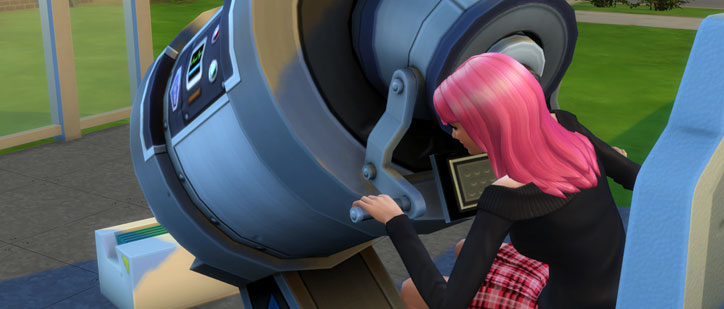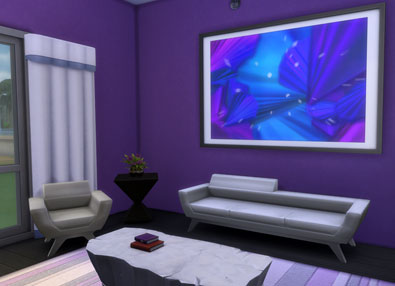Collecting Microscope Prints in The Sims 4
Microscope Prints are great to decorate your house with just like the Space Prints Collection. They have a lot of different strong colors that will go great with most of the standard interior colors. The prints come in different sizes up to 3 tiles big!
You can turn on the emotional aura of some prints to gain the Focused emotion in that room. You can also choose the option ‘View Focused Work’ that gives you +1 Focus for 4 hours.
How to collect all Microscope Prints
First thing you will need to collect all the Microscope Prints is a Microscope. To collect every Microscope Print you will need to level your Sims Logic Skill. You can start collecting the first 6 prints by selecting the option ‘Use’ on the Microscope. The other 6 requires a higher logic skill to unlock the ‘Analyze Sample’ option. When your Sims is Focused when using the microscope you have a better chance of gathering prints.
Collecting and analyzing the slides/samples
To create specific Microscope Prints from Samples you will need to gather slides from Plants, Fossils and Crystals. Choose the option ‘Collect Microscope Sample’ on the item.
- Level 2 Logic Skill will unlock Collect Microscope Samples from Plants.
You can click on any full grown plant to collect microscope sample. - Level 5 Logic Skill will unlock Collect Microscope Samples from Fossils.
Place the Fossil from your inventory on the ground to collect microscope sample. - Level 8 Logic Skill will unlock Collect Microscope Samples from Crystals.
Place the Crystal from your inventory on the ground to collect microscope sample.
You will receive the slide in your inventory. Now you will need to analyze the sample/slide with the Microscope in order to get the Microscope Print.

Microscope Prints Collection
| Microscope Print | Rarity | Price | |
|---|---|---|---|
 | Rhapsody in BlueDon't have a green thumb? No problem. Enjoy plants at the cellular level, where they're actually blue--and in art form, where they require no water, sunlight or "Please don't leave me!" pep talks. Use a Plant Sample to obtain this print | Common | §95 |
 | HooplanktonThis compelling artwork captures the plankton hula hoop performance team mid-rehearsal, for a number that will sink into obscurity when, en route to a gig, the entire team is eaten by a turtle. Use the Microscope to obtain this print | Common | §100 |
 | The DrifterNever fall in love with a plankton. Flowing wherever the current takes them, they are total vagabonds. Here's one such plankton, dancing with groupies after a night playing electric guitar with the Bacteria Band. Fortunately this moment was captured in art. We'll never see him again. Use the Microscope to obtain this print | Common | §105 |
 | Psychedelic RockIf there's one thing we've learned through microscopic explorations into the mineral world it's this: Rocks sure are trippy! Here we have Dunite, magnified fifty zillion percent and captured in bright tempera. Hang it in a college dorm room! Use the Microscope to obtain this print | Common | §110 |
 | Snow FightThey say each snowflake is unique. Up close, these snow crystals, secure in their individual flakiness, appear to be gathering around one deformed snow pyramid, who they will shortly beat up for being TOO different. As this painting reveals, snow is not as gentle as it seems. Use a Crystal Sample to obtain this print | Common | §110 |
 | Party in PinkMagnification reveals interesting facts about microorganisms, such as their preference for bubble gum pink décor and festive streamers hung in their living rooms, all year round. If life on earth were a giant party, microorganisms were the first to arrive, and as this painting reveals, they may be the last to leave! Use the Microscope to obtain this print | Common | §115 |
 | FallingEvoking all the colors of autumn, this mineral painting represents the diminished glow of youth, and the twilight years of life, when all hope is gone, and the path we have taken slides toward its eventual tear-filled end. Hang it in the breakfast nook or the baby's nursery! Use the Microscope to obtain this print | Uncommon | §215 |
 | Blemish BlossomThis artwork chronicles the awkward adolescent stage of plant cell development, where they are tormented by embarrassing acne. Absorbing enough rainwater can really help, and fortunately, a cell can just divide to create its own prom date. Use a Plant Sample to obtain this print | Uncommon | §220 |
 | Cell BlockLook at the precision fit of these bright cells. No wonder they're called the "building blocks of life." In fact, the only difference between toy blocks and living cells is that organisms are not assembled by children. (Except for the platypus; that was built by a third grader named Frank.) Use the Microscope to obtain this print | Uncommon | §220 |
 | Trace RemainsEver just know something in your bones? That's because the skeleton can act as an antennae, transmitting info to the brain. In this dinosaur fossil, we see the haunting conduits where bone instinct may have cried out. "Run! METEOR!" Dinosaurs had brains the size of peas. That's why they all died. Enjoy your painting. Use a Fossil Sample to obtain this print | Uncommon | §225 |
 | Leaf MeatIsn't it strange how zooming in on a fossilized leaf actually makes it look similar to a piece of steak? Are plants and animals more alike than they seem? Do leaves also feel love and fear? What does this say about veganism? Should we eat anything at all? Art raises some serious questions. Use a Fossil Sample to obtain this print | Rare | §445 |
 | Crystal PalaceAt the crux of hard science and new age woo-woo lies the crystal. Here, we can see both the distinctive crystal geometry, revered by scientists for its electrical, optical and mechanical properties, and the glittery crystal sparkles, known for their harmonic love vibrations and aura cleansing magic. Use a Crystal Sample to obtain this print | Rare | §485 |
Complete Collection Reward: Microspace Jockey
 Your attention to microscopic detail (literally) has paid off! The slides you possess are the envy of microscope-toting scientists far and wide, many of whom are now wondering why hadn’t they thought about magnifying their prints to a large gallery size earlier.
Your attention to microscopic detail (literally) has paid off! The slides you possess are the envy of microscope-toting scientists far and wide, many of whom are now wondering why hadn’t they thought about magnifying their prints to a large gallery size earlier.


